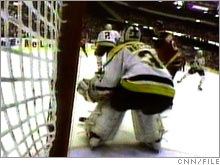 |
| Hockey's back, with strong ticket sales, but some aren't sure that's enough to make the sport a success. |
|
|
|
|
|
NEW YORK (CNN/Money) -
Can the NHL go from being No Hockey League for the past 15 months to being the Now Hot League?
The question isn't as ridiculous as it seems.
When the puck drops next week for the first National Hockey League regular-season game in more than a year, the league will be playing before sell-out crowds, with strong ticket sales in the bank and a new cable network partner that actually values the sport as a key property, rather than an afterthought.
Susan Cohig, the league's vice president of strategic development, says 23 of the 30 teams have had 90 percent or more of their 2003-04 season ticket holders renew their ticket packages. Two years ago, only eight clubs had that renewal rate heading into the season.
In addition, a third of the teams are reporting at least 2,000 new season tickets, and single-game ticket sales are also well ahead of this point two years ago.
"We thought very much we would come back very strong," said Cohig. "Did we think we'd come back this strong? No."
When the Flyers and Rangers meet in the league opener Wednesday night, the game will be carried on OLN -- the upstart sports network owned by cable giant Comcast (Research) that is trying to establish itself as a broader sports network, rather than just the home of the now Lance Armstrong-free Tour de France, professional bull riding and "Survivor" reruns.
The league's national games had previously been shown on ESPN and ABC, both owned by Walt Disney Co. (Research), which valued hockey significantly less than it did poker and maybe even billiards
"We are the prime event for OLN, and they'll invest heavily to promote that," said Cohig.
The OLN risk
But sports marketing consultant Marc Ganis said the move to OLN is risky, even though he expects most hockey fans to find the channel on their cable system.
"OLN does not have other sports viewers coming to watch their network," he said. "You could be hitting the same small group many many times. It's a matter of trying to reach those who aren't already tuning in."
"They took a chance to take a company owned by Comcast. That might end up being a very good thing" Ganis added. "Comcast can promote it -- on its own cable systems -- on ESPN, on Fox Sports Net. Let's see if they do so. That'll say how committed they are."
Ganis and outside observers say that the strong pre-season sales don't tell enough about whether the league can be considered doing well upon its return.
"I expected the hockey fans to want hockey. The question is will they be able to expand the business," said Sal Galatioto of Galatioto Sports Partners, a leading investment banker involved in team sales. "The stronger teams are going to be in good shape. We'll see what happens to more marginalized franchise."
Before the lockout, it was generally viewed that a majority of franchises were for sale. Even with ownership essentially winning the labor dispute, getting most of its demands for revenue sharing and salary caps that should trim player salaries, teams might not be a good investment.
"I think there's more interest in the league right now, but it's on a franchise-by-franchise basis. It depends on the market," said Galatioto "If you're in a good market, the collective bargaining agreement helps you a lot. If it's a marginal market, with a bad building deal, small season ticket base, I would say wait and see."
Cohig said that the strong ticket sales can at least partly be credited to the fact that most teams cut or kept ticket prices steady. But there was also increased marketing efforts by the teams and the league to reach out to its core fan base.
Personalized team jerseys were given to season ticket holders. The Florida Panthers actually held free concerts by groups such as REO Speedwagon, open only to season ticket holders. Other teams offered ticket holders the right to buy tickets to other events being held in the arena before those tickets were put on sale to the general public.
Ganis said that the challenges the teams face winning back fans can be a blessing in disguise if it makes the teams pay more attention to their fan base. Too many teams in too many sports simply depend on the team's on-field or on-ice performance sell their tickets, rather than actively reaching out to customers the way other businesses traditionally do.
"Sometimes desperation leads to the greatest successes," said Ganis. "And the NHL has been in desperate conditions. They're coming back strong so far,but there's a long way to go. I'm not sure that they're back. The season before the lockout wasn't their best season, and the comparisons are all to that."
For a look at what the NHL's labor deal might mean to Major League Baseball, click here.
For more news on the business of sports, click here.

|